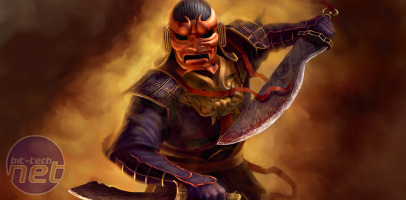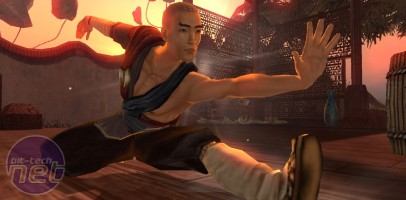
You might think the poor combat, terrible graphics and lack of stats were what made Jade Empire such a bad RPG, but you’d be wrong.
No, what really kills it is how terribly boring it is. It’s dreadful, really; duller than an inflatable knife - and it’s not just simply tedious either. Jade Empire’s banality can be divided into two separate levels of boredom.
Firstly, there’s the plot itself, which is so predictable it’d be enough to make anyone think they’d become clairvoyant. You play an orphan who has been raised by the teacher of an awesome Kung Fu school that sits unmolested in the rural outskirts of the standard Wuxia setting. Apparently you’ve never questioned about your parentage until the day that Master Li ominously lets you know you have an important destiny.
Oh, sorry, not ominously, obviously.
[break]
Turns out Master Li isn’t really a simple teacher, as evidenced by his ability to destroy warships with a single blow and defeat ghosts in battle. He’s actually the brother of the evil Emperor, gone into hiding after realising he was on a dark path after being ordered to wipe out the order of Spirit Monks. It turns out that you’re the last Spirit Monk, which means that Father-figure Master Li effectively engineered the genocide of your people. Rather than being bitter about this, you resolve to follow his every whim and find him when he is conveniently kidnapped. Not before you get a new ghostly guide though, mind.
The plot itself isn’t totally dreadful; clichéd and reliant almost totally on the most boring of stereotypes and over-used tropes, certainly, but not dreadful in and of itself.
Unfortunately, Jade Empire’s story is wounded by the simplicity of the game design and the overwhelming limpness of the writing. It’s not just Bioware’s worst game, but also clearly the laziest. The various twists and turns of the story are handled terribly, with absolutely no subtlety or uniqueness. The characters are all just cardboard cutouts at best and the direction is so bad that not even the vocal efforts of Nathan Fillion can lift the experience out of the mud.
Sometimes it sickens me how lazily and easily some of the writing must have been for Jade Empire. I can imagine the meetings now.
Writer 1: We need to think up the name of the baddie. What can we call him?
Writer 1: How about Death’s Hand?
Writer 1: It’s good, but it needs more. What would he wear, for example?
Writer 1: How about ‘armour black as night and a mask the colour of blood?’ He could have swords and be angry.
Writer 1: Oh, man. You are on fire today!
Writer 1: You want Mexican for lunch? I feel like a burrito.
You might notice all the characters above are called ‘Writer 1’. That’s because if I allow myself even a moment to consider that conceptualising Jade Empire required more than that then I might just die from despair. I honestly believe that watching Crouching Tiger, Hidden Dragon represents the extent of Bioware’s research into the Wuxia genre and the attached mythologies.
I have a theory about Bioware’s last few games (at that point) too. If you look at their back-catalogue you can note an interesting trend. Specifically, the games that immediately predate Jade Empire are ones from entirely different genres: Knights of the Old Republic and Neverwinter Nights. It’s not unforeseeable that Bioware deliberately attacked a broad range of different settings and genres as part of a risk-offsetting strategy or somesuch – if Fantasy isn’t working, maybe Sci-Fi would.
With that in mind, look at all of the games Bioware has made since Jade Empire; Dragon Age covers Fantasy, Mass Effect and Star Wars the Sci-Fi.
Obviously I’m not the only one who didn’t think Jade Empire didn’t work very well.
No, what really kills it is how terribly boring it is. It’s dreadful, really; duller than an inflatable knife - and it’s not just simply tedious either. Jade Empire’s banality can be divided into two separate levels of boredom.
Firstly, there’s the plot itself, which is so predictable it’d be enough to make anyone think they’d become clairvoyant. You play an orphan who has been raised by the teacher of an awesome Kung Fu school that sits unmolested in the rural outskirts of the standard Wuxia setting. Apparently you’ve never questioned about your parentage until the day that Master Li ominously lets you know you have an important destiny.
Oh, sorry, not ominously, obviously.
[break]
Turns out Master Li isn’t really a simple teacher, as evidenced by his ability to destroy warships with a single blow and defeat ghosts in battle. He’s actually the brother of the evil Emperor, gone into hiding after realising he was on a dark path after being ordered to wipe out the order of Spirit Monks. It turns out that you’re the last Spirit Monk, which means that Father-figure Master Li effectively engineered the genocide of your people. Rather than being bitter about this, you resolve to follow his every whim and find him when he is conveniently kidnapped. Not before you get a new ghostly guide though, mind.
The plot itself isn’t totally dreadful; clichéd and reliant almost totally on the most boring of stereotypes and over-used tropes, certainly, but not dreadful in and of itself.
Unfortunately, Jade Empire’s story is wounded by the simplicity of the game design and the overwhelming limpness of the writing. It’s not just Bioware’s worst game, but also clearly the laziest. The various twists and turns of the story are handled terribly, with absolutely no subtlety or uniqueness. The characters are all just cardboard cutouts at best and the direction is so bad that not even the vocal efforts of Nathan Fillion can lift the experience out of the mud.
Sometimes it sickens me how lazily and easily some of the writing must have been for Jade Empire. I can imagine the meetings now.
Writer 1: We need to think up the name of the baddie. What can we call him?
Writer 1: How about Death’s Hand?
Writer 1: It’s good, but it needs more. What would he wear, for example?
Writer 1: How about ‘armour black as night and a mask the colour of blood?’ He could have swords and be angry.
Writer 1: Oh, man. You are on fire today!
Writer 1: You want Mexican for lunch? I feel like a burrito.
You might notice all the characters above are called ‘Writer 1’. That’s because if I allow myself even a moment to consider that conceptualising Jade Empire required more than that then I might just die from despair. I honestly believe that watching Crouching Tiger, Hidden Dragon represents the extent of Bioware’s research into the Wuxia genre and the attached mythologies.
I have a theory about Bioware’s last few games (at that point) too. If you look at their back-catalogue you can note an interesting trend. Specifically, the games that immediately predate Jade Empire are ones from entirely different genres: Knights of the Old Republic and Neverwinter Nights. It’s not unforeseeable that Bioware deliberately attacked a broad range of different settings and genres as part of a risk-offsetting strategy or somesuch – if Fantasy isn’t working, maybe Sci-Fi would.
With that in mind, look at all of the games Bioware has made since Jade Empire; Dragon Age covers Fantasy, Mass Effect and Star Wars the Sci-Fi.
Obviously I’m not the only one who didn’t think Jade Empire didn’t work very well.

MSI MPG Velox 100R Chassis Review
October 14 2021 | 15:04








Want to comment? Please log in.